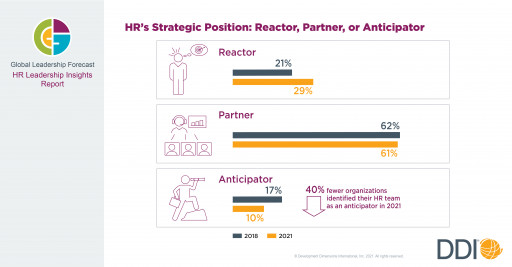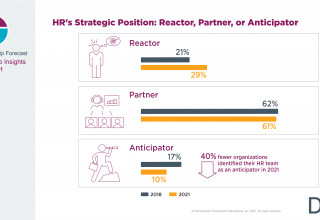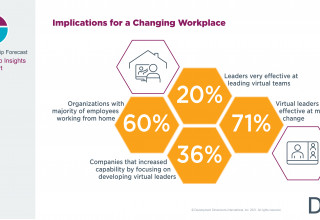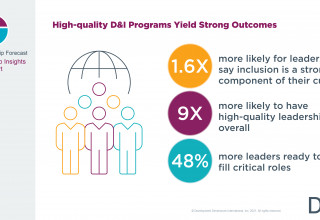
DDI HR Leadership Insights Report: HR's Strategic Role as Reactor, Partner, or Anticipator
Graphic showing how HR's strategic role is categorized based on being Reactors, Partners, or Anticipators
PITTSBURGH - October 20, 2021 - (Newswire.com)
In one of the most turbulent labor markets in history, HR's strategic role in shaping talent and leadership is hanging in the balance. Released today, DDI's HR Leadership Insights Report, part of the Global Leadership Forecast series, shows the turbulent road ahead for HR. The study examines how the changing landscape of the past year is shaping critical HR leadership challenges for 2022. It includes data from more than 15,000 leaders and 2,100 human resource professionals collected in 2020, as well as a survey of a subset of HR respondents conducted in September 2021.
"HR is in a really tough position right now," said Stephanie Neal, one of the report's authors and director of DDI's Center for Analytics and Behavioral Research (CABER). "They're tasked with creating a deeply flexible, highly supportive and diverse work culture where employees can grow while avoiding burnout. At the same time, they are dealing with their own lean HR teams, and extremely high turnover, which is forcing them to be more reactionary than strategic."
Since 2015, DDI has tracked HR's influence in their organizations based on three categories:
- Reactors, who primarily respond to business needs and ensure policy compliance,
- Partners, who work with business leaders to address talent issues, and
- Anticipators, who play a strong role in talent strategy, fed by analytics and data, and provide insights into future talent gaps and how talent quality relates to business strategy.
While high turnover rates and a tumultuous, candidate-driven labor market create a deeper need for strategic HR, fewer HR departments have the capability of filling that roll. Since 2018, 40% fewer HR professionals identified their team as an anticipator. Rather, many HR teams are forced into reactive mode, barely keeping their heads above water.
Without further investment to improve the capacity and capability of their HR talent teams, companies may find themselves at a severe disadvantage in the war for talent. Meanwhile, the 10% of companies with strong, anticipator-style HR teams are better positioned to attract and retain top talent, especially leaders.
Other key findings from the report include:
- Strong virtual leaders are key to driving change, but there aren't many of them. Only 20% of leaders are very effective at leading virtual teams, which is obviously a problem for many companies with virtual or hybrid cultures. However, 71% of these leaders are also highly effective at managing change, showing that many of the qualities that make them effective in a virtual environment also enable them to lead through ambiguity and change.
- High turnover encourages leaders to focus on the remaining teams: More than half of companies are experiencing higher turnover than a year ago. Among them, 20% of HR say that turnover has increased significantly. While previous studies from the Global Leadership Forecast series focused on how leaders can prevent burnout and turnover, this study revealed the leadership skills that helped remaining teams to thrive, including delegation and empowerment; leading virtually; and digital acumen.
- High-quality diversity and inclusion (D&I) programs yield strong outcomes, yet 41% of companies have low-quality or non-existent D&I programs. At a time when world events have put a spotlight on diversity, inclusion and equity, most HR professionals are skeptical of the quality of their D&I programs. Meanwhile, D&I programs rated high-quality by HR are yielding significant results. Companies with high-quality D&I programs were 9x more likely to have overall high-quality leadership, and had 48% more leaders ready to fill critical roles. In those companies, leaders were also 1.6x more likely to say that inclusion is a strong part of their culture.
- Companies should focus on leadership retention. While many efforts to stem the tide of turnover are focused on frontline employees, HR also needs to be pay attention to retaining their leaders, as only 52% of leaders hired externally are successful in their roles, compared to 65% of internally promoted leaders. These internal success rates are also reflective of an overall stronger leadership culture. Companies in which internal promotion success rates are high are 4.7x more likely to have high overall leadership quality.
For more information, including the full report, visit https://www.ddiworld.com/research/hr-leadership-insights-report.
###
About DDI
DDI is a global leadership consulting firm that helps organizations hire, promote and develop exceptional leaders. From first-time managers to C-suite executives, DDI is by leaders' sides, supporting them in every critical moment of leadership. Built on five decades of research and experience in the science of leadership, DDI's evidence-based assessment and development solutions enable millions of leaders around the world to succeed, propelling their organizations to new heights. For more information, visit ddiworld.com.
Available for Interviews
Stephanie Neal, director of DDI's Center for Analytics and Behavioral Research
Contact:
Beth Almes
Related Images

DDI HR Leadership Insights Report: HR's Strategic Role as Reactor, Partner, or Anticipator
Graphic showing how HR's strategic role is categorized based on being Reactors, Partners, or Anticipators

DDI HR Leadership Insights Report: Leadership Implications for a Changing Workplace
Graphic from DDI HR Leadership Insights Report showing statistics about virtual leadership skills, including that only 20% of leaders are very effective at leading virtual teams, but 71% of virtual leaders are highly effective at managing change

DDI HR Leadership Insights Report: High-Quality D&I Programs Yield Strong Outcomes
Graphic shows how companies with high-quality D&I programs are more likely to have inclusion embedded in their culture, much higher-quality leadership overall, and 48% more leaders ready to fill critical roles
Press Release Service by Newswire.com
Original Source: 2022 Will Be a Tough Year for HR as They Grapple With Leadership Challenges, According to New DDI Report
